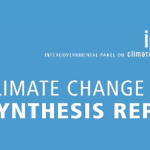Green New Deal Resolution Hits The House
![]() On the fourth anniversary of the Green New Deal’s debut, the deal was reintroduced to the House. The ambitious act Congresswoman Alexandria Ocasio-Cortez and Senator Edward J Markey constructed is the largest piece of climate legislation in the history of the nation. The Deal addresses the climate crisis with a 10-year plan. Implementation of a ‘social cost of carbon’ rule, a high-speed rail, and the creation of good-paying state union jobs for millions were all part of the resolution. Some of the goals presented are repairing and upgrading infrastructure, guaranteeing access to clean water, promoting the international exchange of technology and expertise, building sustainable food system and land use practices to cut the climate impact of agriculture, meeting 100 percent of U.S. power demand through clean, renewable, and zero-emission energy sources, and building resiliency against climate change.
On the fourth anniversary of the Green New Deal’s debut, the deal was reintroduced to the House. The ambitious act Congresswoman Alexandria Ocasio-Cortez and Senator Edward J Markey constructed is the largest piece of climate legislation in the history of the nation. The Deal addresses the climate crisis with a 10-year plan. Implementation of a ‘social cost of carbon’ rule, a high-speed rail, and the creation of good-paying state union jobs for millions were all part of the resolution. Some of the goals presented are repairing and upgrading infrastructure, guaranteeing access to clean water, promoting the international exchange of technology and expertise, building sustainable food system and land use practices to cut the climate impact of agriculture, meeting 100 percent of U.S. power demand through clean, renewable, and zero-emission energy sources, and building resiliency against climate change.
Along with the reintroduction, Congresswoman Ocasio-Cortez announced a new implementation tool providing cities, states, Tribes, nonprofits and individuals with the tools to take full advantage of new federal funding in order to create on-the-ground progress toward a Green New Deal future. With a total of $10.8 billion in funds allocated for Goal 1: Building Resiliency Against Climate Change, the programs provide funding for investments in community-defined projects and strategies. The grants are broken down into subsections with specifications. The Deal would bring new resources for the Atlanta Mayor’s Office of Sustainability and Resilience (SaR). Mayor Andre Dickens stated last year in August of 2022 when he enhanced the SaR office, “The world is experiencing a climate crisis, and our Administration understands the sizeable impact rising energy costs, barriers to food accessibility and other hardships have on communities across Atlanta—particularly those in historically underserved areas”. One of the Deal’s initiatives addresses equitable social and economic systems for vulnerable communities ensures clean air and water, healthy food, and access to nature for all. The inclusivity of ‘all’ will allow communities currently feeling the worst impacts of climate change a seat at the table.
Biden announced earlier this month $1 billion in grants increasing equitable access to trees and green spaces in urban and community forests where more than 84% of Americans live, work and play. The Green Deal before the Senate will include the Green New Deal for Cities Act which includes creating new greenspaces. Livable Buckhead’s greenspace initiative action plan creating an interconnected network of parks, trails of greenspaces will possibly have more resources to implement their vision. Since 2011, when sustainability organizations were few and far between and most sustainability projects were considered unrealistic, Livable Buckhead powered forward toward their vision just as the reintroduced Green New Deal.
“First, we were called unrealistic. Then, when it was when it came time for the Bipartisan Infrastructure Law and Inflation Reduction Act, we started to fight,” Ocasio-Cortez said. “We said we are not going to take crumbs, and we’re not going to settle for that — we need bold big climate action, and we need it now.”
Teresa Perkins is a climate change and sustainability journalist, who is creating research-based climate change content pertaining to sustainable energy at local, national, and global level for publication and distribution. She partners with non-profit organizations for innovative ideas and sustainability projects and connects global UN Climate Change reports to local initiatives.





